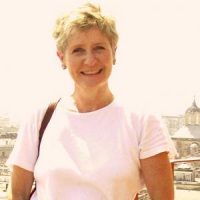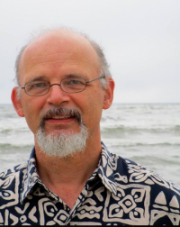 Caroline Bruzelius, Anne M. Cogan Professor Emerita of Art, Art History, and Visual Studies at Duke University.
Caroline Bruzelius, Anne M. Cogan Professor Emerita of Art, Art History, and Visual Studies at Duke University.
Lecture, Oct. 8, 5:00-6:30 pm Dauer 219 (Ruth McQuown Room): “Generating New Knowledge with Technologies: Case Studies in the Field and the Classroom.”
Watch recording of livestream: https://mediasite.video.ufl.edu/Mediasite/Play/4f155def11cc44a18f38731dced51d0e1d
This talk looks at the use of ground-penetrating radar, laser scanning, 3D modeling and animations and other digital technologies as new ways of understanding and interpreting material culture in the medieval world. Professor Bruzelius focuses on how interdisciplinary collaboration that integrates a range of technologies can generate new knowledge. Working this way can also become a very effective tool for reaching out to the public about the history of place and space. In the Wired! Lab at Duke University, Professor Bruzelius and colleagues have had great success in training and engaging undergraduates and graduate students in working together on digital mapping and modeling research projects; they have also integrated digital technologies into traditional courses on history and material culture. This approach, however, raises interesting questions about disciplinary boundaries, the traditional canons of objects and materials, and teaching methodology.
Introduction by Will Hasty (German/LLC; Codirector, Center for Medieval and Early Modern Studies).
Panel Discussion, Oct. 9, 5:00-6:30 pm Dauer 219 (Ruth McQuown Room): “Cyberspace and Communities of Learning: International and Interdisciplinary Collaborations.”
Watch recording of livestream: https://mediasite.video.ufl.edu/Mediasite/Play/dbf4b2f843994205a29a1e14459c978f1d
Professor Bruzelius discusses two case studies to describe the strengths and challenges of international collaborations on mapping and modeling cities and historical sites: Visualizing Venice http://www.visualizingvenice.org/visu/?page_id=16 and The Kingdom of Sicily Image Database http://kos.aahvs.duke.edu/index.php. Both projects engage with scholars in a variety disciplines (Art/Architectural History, Engineering, Architecture, Urban Studies) with the faculties of the universities of Padua, Venice, Naples, and Catania.
Including presentations by and discussion with Eleni Bozia (Classics; Digital Epigraphy Project: http://www.digitalepigraphy.org; Perseids Consortium: https://www.perseids.org/ ) and Richard Wang (Chinese/LLC; Research on History and Contemporary Local Daoism International Collaborative Academic Conference and Research Project: http://www.cckf.org/en/programs/recipients/2015/03903?set_language=en).
Introduction by Mary Watt (Italian/LLC; Codirector, Center for Medieval and Early Modern Studies; Associate Dean, College of Liberal Arts and Sciences). Moderated by Will Hasty (German/LLC; Codirector, Center for Medieval and Early Modern Studies).
. . .
 Simon Richter, Class of 1942 Endowed Term Professor and Interim Chair of the Department of Germanic Languages and Literatures at the University of Pennsylvania.
Simon Richter, Class of 1942 Endowed Term Professor and Interim Chair of the Department of Germanic Languages and Literatures at the University of Pennsylvania.
Lecture, November 13, 5:00-6:30 pm Dauer 219 (Ruth McQuown Room): “Getting Creative: Translation and Etymology as Cultural Narratives of Sustainability and Resilience in Germany, Israel, the Netherlands & Indonesia.”
Watch recording of livestream: https://mediasite.video.ufl.edu/Mediasite/Play/bb7e840c1b754fccbf8285568fd2111d1d
In his lecture, Professor Simon presents four case studies that show how the translation of two terms, sustainability and resilience, can reveal the distinctive cultural and intercultural stakes of communities as they respond to the climate crisis. Sustainability made its way onto the world’s stage abruptly with the publication of what is known as the Brundtland report, a widely-disseminated UN document, which introduced the concept of sustainable development. Insofar as nations and language communities operate within UN frameworks and wish to involve their citizenry, corresponding words in the home language were required. Through strategic translation and creative etymology, language communities had a unique opportunity to specify the cultural narrative that underwrites their commitment or approach to sustainability. Professor Simon’s presentation begins in the German Enlightenment with the story of Nachhaltigkeit, and moves on to consider the linguistic situation in Israel, Indonesia, and the Netherlands.
Introduction by Will Hasty (German/LLC; Codirector, Center for Medieval and Early Modern Studies).
Panel Discussion, November 14, Dauer 215 (12:00-1:30 pm): “Polder-Geist: Dutch Responses to Rising Sea Levels and Sinking Cities in the Netherlands, the United States and Asia.”
Watch recording of livestream:
https://mediasite.video.ufl.edu/Mediasite/Play/a626ac3a75c848419707e598773c73f21d
Coastal cities around the world are already contending with the effects of sea level rise. For many, the problems are exacerbated by subsidence. Cities are sinking and seas are rising. Hundreds of millions of people will be affected. Enter the Netherlands. Building on proud traditions of coastal defense, land reclamation, and water management, the Dutch avidly pursue what they call their “international water ambition.” In New York, Miami, Houston, Ho Chi Minh City, Jakarta, Dhaka, and many more, you will find the Dutch government and Dutch engineering and design companies promoting the Dutch approach. Dutch design slogans capture the range of their ambition: Rebuild by Design, Building with Nature, the Blue Revolution, the Floating City, Room for the River. The Dutch are intent on turning problems into opportunities. In this workshop, we will explore the intercultural aspects of the Dutch international water ambition in several case studies.
Including discussion with Terry Harpold (English), Angela Lindner (Environmental Engineering Sciences), Chris Silver (College of Design, Construction & Planning), and Les Thiele (Political Science).
Introduction by Barbara Mennel (English and German/LLC; Director, Center for Humanities and the Public Sphere). Moderated by Will Hasty (German/LLC; Codirector, Center for Medieval and Early Modern Studies).
The Global-Cultural Sustainability Symposia are supported by the Waldo W. Neikirk Fund, the University of Florida International Center, the Department of Languages, Literatures, and Cultures, the Center for Medieval and Early Modern Studies, and Imagining Climate Change.